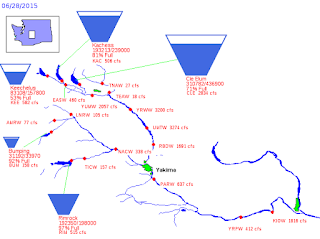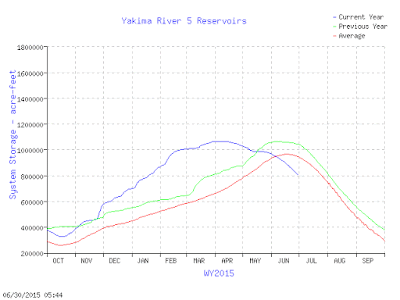Who are these new superheroes? Local reservoir managers at the the Bureau of Reclamation and the Seattle Public Utilities, to name a few.
The most important agricultural area in Washington State is the Yakima River Valley, where irrigated agriculture produces huge amounts of apples, cherries, hops, vegetables, and other crops. The U.S. Bureau of Reclamation controls the Yakima reservoirs, which store water for use during the summer. These reservoirs also protect the Yakima drainage from floods, particularly during spring when large amounts of melting snowpack flow into the streams and rivers. The Bureau of Reclamation has an online "teacup" graphic that shows the current status of the 5 reservoirs (see below).
Now let me show you a stunning figure. An amazing figure. One that shows you the results of the heroic folks at the Bureau of Reclamation. Something the media hasn't picked on.
The red line in the figure below shows the total storage (the sum of all five reservoirs) for an average year by month. Generally, the reservoirs are kept quite low during the winter so that there is plenty of space to fill during the spring and early summer as the Cascade snowpack melts. The reservoirs generally peak in June and then rapidly fall as the snowmelt fades and as water is needed for irrigation during the hot summer months.
The green line is the previous year's (2013-2014) reservoir values. A bit above normal but following the typical annual variation.
But look at this year (blue line). Something VERY different has happened. During November, Bureau of Reclamation managers made a daring decision. They knew the snowpack was not building up as normal, that the Pacific was warmer than normal, and that seasonal forecasts were for warm conditions and less snow in the mountains. They knew that normal precipitation was predicted. So they made a unprecedented decision to begin storing large amounts of water starting starting in late November and continued to do this all winter.
As a result, by late winter they had saved unprecedented amount of water in the Yakima reservoir system, a total exceeding the normal peak in June. Specifically, starting in early April they had roughly 50% more water than normal in the reservoirs and during the subsequent months they released water to make up for the lack melting snowpack.
Today, the last day in June, the Yakima reservoir storage is a bit more than 80% of normal-- a real triumph. Sufficient water exists to main required flows in the Yakima system into early September, which will allow sufficient irrigation for all the main crops. Also helpful was a week of rain in May and the decision of the Roza Irrigation District to forgo water deliveries for a few weeks in May.
To put it another way, with a severe lack of snow in the mountains and warm temperatures--the conditions expected in roughly 2070-- agriculture in the the Yakima basin will not be hurt by much. In fact, near normal crops are expected, as shown by recent headlines in local newspapers. This is extraordinary.
Someone or some group in Reclamation deserves a medal.
And here in Seattle, managers at Seattle Public Utility also made some aggressive calls, storing more water than usual in April and May, when rain was still failing (see red line below). Here is a plot of this year's snowpack above Seattle's reservoirs...pathetic.
And here is the combined reservoir storage serving Seattle--you can see how they maxed the reservoir levels out April. A problem is that the demand for water is great because of the warm conditions and the reservoir levels are falling quickly. Seattle does not have any water restrictions right now, but considering the trend, it might be wise for SPU to ask Seattle residents to voluntarily reduce their water usage.
The bottom line is perceptive managers of our local reservoirs can make a huge difference in helping us get through this warm year with little snowpack.
We are now undergoing a 2070 climate stress test and you know something?
We just might pass.
R stands for reservoir
![Reds Fly Shop [logo]](/img/reds-fly-shop/logo.png)



